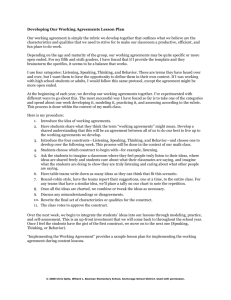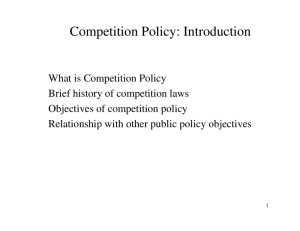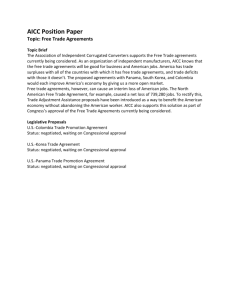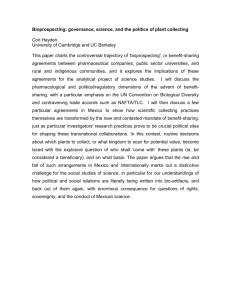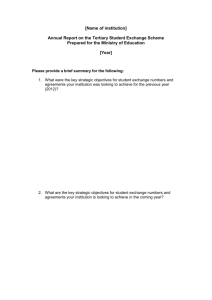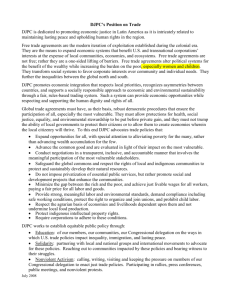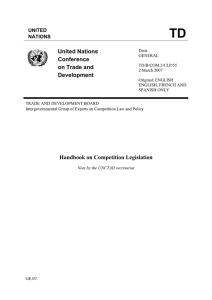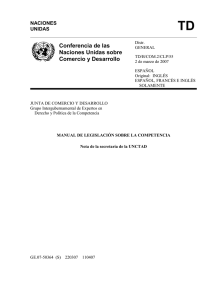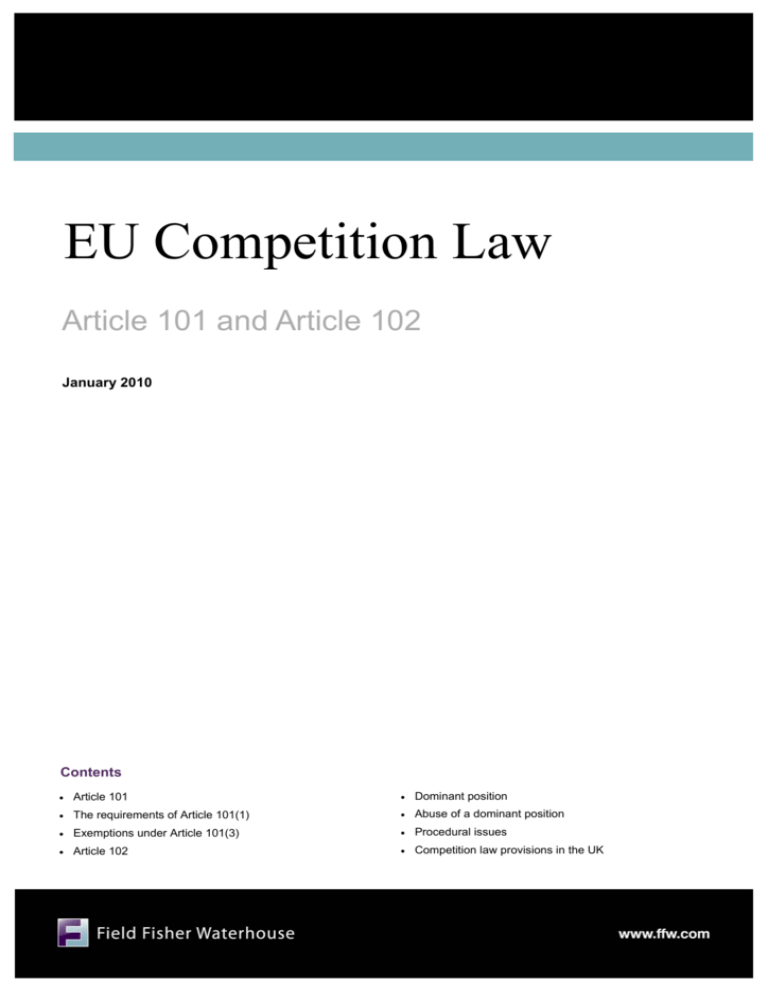
EU Competition Law
Article 101 and Article 102
January 2010
Contents
•
Article 101
•
Dominant position
•
The requirements of Article 101(1)
•
Abuse of a dominant position
•
Exemptions under Article 101(3)
•
Procedural issues
Article 102
•
Competition law provisions in the UK
•
EU Competition Law
Article 101 and Article 102
EU Competition Law: Article 101 and Article 102
The European Community was established in 1957 by the Treaty of Rome and initially comprised six Member States.
Following the entry into force of the Treaty of Lisbon on 1 December 2009, the EC Treaty is called the Treaty on the
Functioning of the European Union (TFEU). The European Union comprises 27 Member States: Austria, Belgium,
Bulgaria, Cyprus (Greek), the Czech Republic, Denmark, Estonia, Finland, France, Germany, Greece, Hungary,
Ireland, Italy, Latvia, Lithuania, Luxembourg, Malta, the Netherlands, Poland, Portugal, Romania, the Slovak
Republic, Slovenia, Spain, Sweden, and the United Kingdom.
One of the basic goals of the EU is to create a single, or “common”, market within Europe. The aim is to allow
people, goods, services and capital to move freely among the Member States. To help achieve this basic goal and
ensure that consumers are treated fairly and resources allocated efficiently, competition laws which prohibit certain
business practices are included in the TFEU.
The key competition law provisions are:
2
•
Article 101, which prohibits restrictive agreements; and
•
Article 102, which prohibits the abuse of a dominant position.
Article 101
The requirements of Article 101(1)
Article 101(1) prohibits as incompatible with EU principles, all agreements between undertakings, decisions by
associations of undertakings, and concerted practices which may affect trade between Member States and which
have as their object or effect the prevention, restriction, or distortion of competition within the EU.
The following must be established for an infringement of
Article 101(1):
•
an agreement or concerted practice between two or
more undertakings, or a decision by an association of
undertakings;
•
which has as its object or effect the prevention,
restriction or distortion of competition;
•
an appreciable effect on competition; and
•
an appreciable effect on trade between Member States.
The concept of an “undertaking” under Article 101 includes
individuals, partnerships, corporations, limited partnerships,
trusts, charities, co-operatives, nationalised firms, stateowned commercial organisations and non-profit making
organisations. It could also include government
departments and agencies in respect of certain activities.
The European Court of Justice has stated that “in the
context of competition law, the concept of an undertaking
encompasses every entity engaged in an economic activity,
regardless of the legal status of the entity and the way in
which it is financed”.
Agreements made between companies within the same
corporate group will generally not be caught by the
competition rules as they will all be treated as part of the
same economic entity. It is only when the subsidiary
company has the freedom to determine its own prices and
marketing policy that the parent and subsidiary may be
regarded as separate.
“Agreement” is widely construed and includes written
agreements and oral agreements, whether or not they are
intended to be legally binding. Informal agreements and
“gentlemen’s agreements” are caught: it is sufficient that
the undertakings in question have expressed their joint
intention to conduct themselves on the market in a
specified way. Moreover, the companies involved need
not actually reach an agreement as the term “concerted
practices” covers collusion falling short of a definite
agreement. A concerted practice might be found, for
example, where one company “signals” to its
competitors a future price increase, and that company
and its competitors then were to increase prices at or
about the same time.
For Article 101(1) to apply, the object or effect of the
agreement must be to prevent, restrict or distort
competition. A non-exhaustive list of agreements which
are likely to be anti-competitive are set out in Article 101
(1) and include directly or indirectly fixing purchase or
selling prices or any other trading condition, limiting or
controlling production, markets, technical developments,
or investment and sharing markets or source of supply.
“Hardcore” restrictions such as price-fixing and market
sharing are generally considered to constitute
restrictions by object. If the object of the agreement is
restrictive of competition, it need not be established that
it also has restrictive effect, meaning that agreements
which are not actually implemented can be caught.
Where it is not obvious that the object is to restrict
competition, it is necessary to assess whether or not the
effect is to prevent, restrict or distort competition. Even if
there is no intention, agreements can violate the law if
the effect of the agreement is to restrict competition.
Article 101(1) requires that the effect on competition
should be appreciable. The Commission recognises that
many agreements between companies with small market
shares or which are small in size (agreements of minor
importance and agreements between SMES) are
unlikely to have any adverse appreciable affect on
competition. Unless they contain certain hardcore
restrictions, such agreements will not infringe Article
101(1).
3
EC Competition Law
Article 101 and Article 102
Finally, Article 101(1) requires an appreciable effect on
trade between Member States in order for the Commission
to have jurisdiction. Where an agreement that restricts
competition does not have an appreciable effect on trade
between Member States then national competition rules are
likely to apply. It should be noted that even if a company is
not located in a Member State, its activities are subject to
the EU competition laws if those activities affect trade
between Member States. Although “effect on trade” is
widely defined, agreements between companies with small
market shares may benefit from a presumption that such
agreements do not have an appreciable effect.
Agreements that fall within the prohibition are void and
unenforceable.
Exemptions under Article 101(3)
Even if an agreement is caught by Article 101(1), it may
benefit from an exemption under Article 101(3). Companies
must assess for themselves whether an agreement meets
the criteria for exemption. The Article 101(3) criteria are
that the agreement contributes to improving production or
distribution, promotes technical or economic progress,
allows consumers a fair share of the resulting benefit, does
not impose restrictions which are not indispensable to
4
achieving those objectives, and does not eliminate
competition. If these criteria are all met, the agreement
may be exempt from the application of Article 101(1).
Companies may however find that there is greater legal
certainty by drafting agreements to ensure that the
agreement is consistent with the terms of a block
exemption. In particular, an agreement may benefit from
the “safe harbour” provided by the Vertical Agreements
Block Exemption, which applies to agreements entered
into between two or more firms operating at different
levels of the production or distribution chain. Virtually all
vertical agreements are exempted by the block
exemption provided that the market shares of the
supplier and buyer are below 30%. However, any
agreement that contains a hardcore restriction will not be
exempt. Hardcore restrictions include resale price
maintenance and territorial restrictions.
There are also other block exemptions that may be
relevant, such as the Technology Transfer Block
Exemption.
Article 102
Article 102 prohibits abusive business conduct by
an undertaking where that undertaking has a
dominant position in a given market within the EU.
In contrast to Article 101, Article 102 applies to unilateral
action - so a company may violate Article 102 even if it is
acting alone.
There are three key requirements which must be
satisfied in order for the Article 102 prohibition to be
applicable:
•
an undertaking must hold a dominant position;
•
there must also be an abuse of that dominant
position; and
•
there must be an effect on trade between Member
States.
Dominant position
Article 102 only applies where an undertaking has a
“dominant position”, which effectively means market
power. To determine whether or not this is the case it is
necessary to examine the relevant market, the
undertaking’s position in that market, and whether the
dominant position is in a “substantial part of the common
market”.
Relevant market is defined in terms of the product
market, geographic market, and (occasionally) temporal
market. The main purpose of market definition is to
“identify in a systematic way the competitive constraints
that the undertakings involved face”. These constraints
include demand substitutability, supply substitutability
and potential competition.
Once the relevant market is defined, it is then necessary
to determine whether the undertaking holds a “dominant
position”, or substantial market power, on that market.
The test of dominance under Article 102 is whether or
not an undertaking has such economic strength that it is
able to impede effective competition in the relevant
market by behaving to an appreciable extent
independently of its competitors and customers. In
general a company has a dominant position if it can act
independently on the market and take pricing and similar
actions largely without regard to its competitors,
customers or suppliers.
The assessment of market power and dominance takes
into consideration numerous factors. A key factor is
market share: the larger the market share, the more
likely a finding of dominance. A rule of thumb has
emerged from the European cases regarding the
consideration of dominance: where a party had a market
share in excess of 80%, that will be sufficient proof of
dominance; a market share of 50% is presumptive of
dominance (though not conclusive); a market share of
40% will usually not be enough by itself to be dominant;
and a party with a market share of less than 20 - 25%
will not be regarded as dominant.
However market share is not determinative, and other
“factors indicating dominance” must also be taken into
account. These include the existence of any barriers to
entry and the extent of any countervailing buyer power.
Abuse of a dominant position
Article 102 does not prohibit dominant positions per se –
in order to be caught by Article 102 there must also be
an abuse of that dominant position.
Article 102 includes a non-exhaustive list of examples of
abusive conduct: directly or indirectly imposing unfair
purchase or selling prices or other unfair trading
conditions, limiting production, markets or technical
developments to the prejudice of consumers, applying
dissimilar conditions to equivalent transactions with other
trading parties and making the conclusion of contracts
subject to acceptance of supplementary obligations
which have no connection with the contracts.
The Commission tends to categorise abusive behaviour
as either exclusionary or exploitative. Exploitative
abuses would include the imposition of unfair purchase
or selling prices or other unfair trading conditions. The
Commission is generally reluctant to act as a price
regulator and it is often difficult to determine what is an
excessive price. Article 102 has been more frequently
applied to behaviour which is exclusionary and aimed at
eliminating existing competitors or preventing new
5
EU Competition Law
Article 101 and Article 102
entrants to a market. Examples of exclusionary abuse
include refusals to supply, requirements contracts, tie-ins,
predatory pricing and price discrimination.
individuals or send them to jail. Some Member States
do however have such powers, e.g. the UK.
Appeals
There is no direct equivalent to the Article 101(3)
exemption under Article 102. However, behaviour that
would otherwise be caught by Article 102 may not be
abusive if the company has an objective justification for its
actions and if it has behaved in a proportionate way.
Decisions by the European Commission may be
appealed to the General Court. The Court has the
power to annul a Commission decision, in whole or in
part, and may reduce (or even increase) the level of the
fine. It is possible to appeal a decision of the General
Court, although only on a point of law, to the European
Court of Justice.
Procedural issues
The Commission’s powers of
investigation
The Commission has extensive powers to investigate
suspected breaches of the competition rules under
Regulation 1/2003. It can initiate on its own or respond to
complaints. The Commission can require answers to
questions, production of documents and other information,
and it may conduct on-site inspections either with or without
notice. Commission officials have the right to enter
premises where documents may be found, including private
home and cars. The Commission has the power to search
for various items of information, including those which are
not already known or fully identified.
Fines and penalties
Where breaches have been established, the Commission
may impose fines of up to 10% of the total worldwide
turnover in the preceding business year. In fixing the
amount of the fine the Commission is required to have
regard to the gravity of the infringement and its duration.
The European Commission does not have the power to fine
6
Competition law provisions
in the UK
The UK, in common with all Member States, has its own
competition provisions modelled on Article 101 and
Article 102. These are set out in the Competition Act
1998. The “Chapter I prohibition” in the Act reflects
Article 101 and prohibits agreements, decisions by
associations of undertakings and concerted practices
that have as their object or effect the restriction of
competition. The “Chapter II prohibition” reflects Article
102 and prohibits the abuse of a dominant position.
The OFT is charged with enforcing the competition rules
in the UK and has jurisdiction to apply both UK and EC
rules. It has powers to obtain information, carry out onthe-spot investigations, adopt decisions and impose
fines on undertakings. The Enterprise Act 2002
introduced a new criminal “cartel offence” which can lead
to the imprisonment of individuals for up to five years
and/or the imposition of a fine of an unlimited amount, as
well as the disqualification of company directors.
Contacts
Charles Whiddington
Partner
t: +44 (0)20 7861 4966
e: charles.whiddington@ffw.com
Nicholas Pimlott
Partner
t: +44 (0)20 7861 4073
e: nicholas.pimlott@ffw.com
John Cassels
Senior Associate
t: +44 (0)20 7861 4948
e: john.cassels@ffw.com
EU Competition Law
Article 101 and Article 102
This publication is not a substitute for detailed advice on specific transactions and should not be taken as providing legal advice on any of the topics discussed.
© Copyright Field Fisher Waterhouse LLP 2010. All rights reserved.
Field Fisher Waterhouse LLP is a limited liability partnership registered in England and Wales with registered number OC318472, which is regulated by the Law Society.
A list of members and their professional qualifications is available for inspection at its registered office, 35 Vine Street London EC3N 2AA. We use the word “partner” to
refer to a member of Field Fisher Waterhouse LLP, or an employee or consultant with equivalent standing and qualifications.

